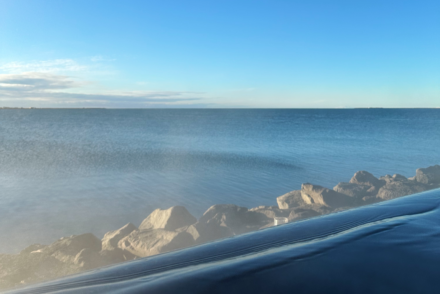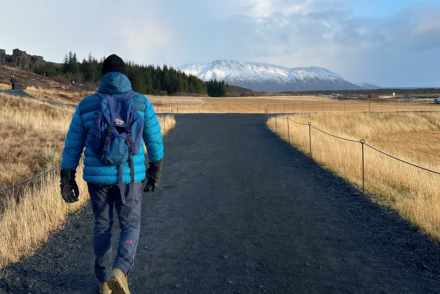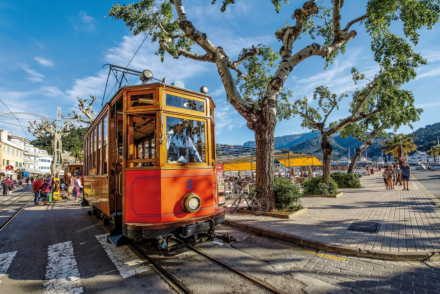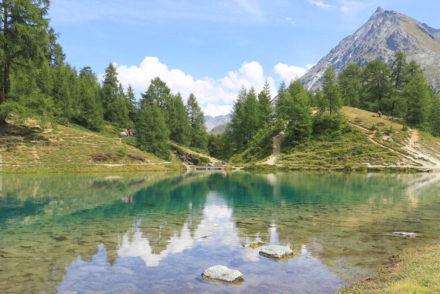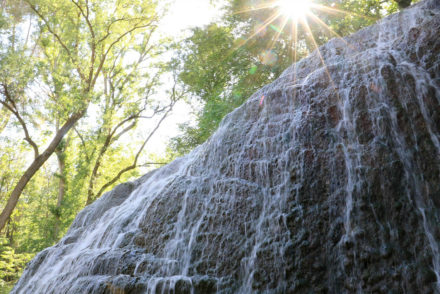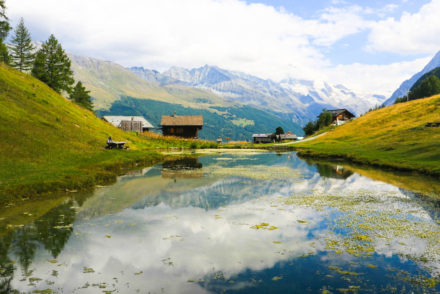There are some incredible places to see in Northern Spain, largely untouched by tourism like its southern counterpart. We’ve embarked on road trips to the Cantabria, Asturias and Aragon regions – the scenery is spectacular. Green Spain has plenty for the family to do and is easily accessible from the UK. We’ve travelled by ferry from the UK with Brittany Ferries (to Santander and to Bilbao) with flights to both destinations and Zaragoza. We’d recommend driving from the UK, or at least hiring a car when you arrive in Spain, so you can make the most of your trip. If you’re looking for inspiration, here are some of the best places to see in Northern Spain.
Explore the best places in Northern Spain
Cantabria
Take in the views at Picos de Europa
Cantabria is a joy and we stayed in a beautiful 200-year cottage in the Pico de Europa region which provided spectacular views. Every day we’d watch the morning mist rise from the mountains from our balcony with evenings spent admiring the swallows as they circled the rooftops. Our accommodation, in the Liebana region, was just half an hour from Fuente Dé where you can catch the cable car to the Picos de Europa. It’s said to have taken 300 million years for the Picos to take on their current form.
The park has the highest limestone formation in Atlantic Europe and is shaped by three regions – El Cornión in the West, Los Urrieles in the Central area and Ándara in the East. The views from the top are staggering and the section we walked was fairly flat so not too strenuous for younger children. It has to be one of your must-visit places to see in Northern Spain if you’re heading to Cantabria.




Hike from Dobarganes to Pico Jano
One of the joys of taking our car to Cantabria was exploring wherever we liked. Although we do plan so we don’t miss the places we want to see, it’s nice to go with the flow too. Trekking to Pico Jano (1,446 metres) was a great example of doing just that. The mountain is only accessible by foot from a small village called Dobarganes where we didn’t see a soul – just a few cows in a field. Although fairly remote, the area is surrounded by magnificent scenery and you feel like you’re on top of the world.




Go wild swimming in medieval Potes
Potes is a medieval town in the Cantabria region. It’s a pretty place we thought we’d visit when we needed a supermarket but it became somewhere that was quite special to us. POD loved swimming in the river with the locals which became a bit of a thing. We’d stop off in Potes regularly, usually after a day exploring, to wander the cobbled alleyways, sample Spanish tapas and go wild swimming. Potes is one of the prettiest towns in the Cantabria region and did get busy at times although we typically visited towards the end of the day when it was quieter. One of the places to see in Northern Spain though, we loved it here.




Discover villages in Northern Spain
From the balcony of the cottage we were staying in, we could see remote villages set on the hillside. We made sure we visited these and pretty much everything in between as it’s great to see how the locals live. We had a picnic one day and were joined by several chickens, including one half-plucked that escaped, and a couple of friendly dogs. The sign below was spotted just after we’d left the bar it referred to, situated on a deserted mountain road. We even found a picnic area in the mountains one day, complete with swings, goalposts and the most spectacular scenery. One of the joys of having the car, discovering remote places in Northern Spain.





Visit the El Soplao caves
There are some magnificent caves in the world, like the Vatnajokull Glacier in Iceland, Batu in Malaysia and the Marble Caves in Patagonia. For us, white water rafting in the Waitomo Glowworm Caves in North Island, New Zealand has certainly been a highlight. Right up there has to be the El Soplao Caves in Cantabria. Located in Sierra de Arnero, with an altitude of 540m, the area is surrounded by great views including the Sierra de Pena Sagra, the valley of the Nansa river and the Cantabrian sea. Photography is not permitted inside the caves but I purchased some postcards and photographed these to highlight what it’s like underground.
There are a couple of tours you can take at El Soplao. The one we did (suitable for the under 12’s) takes you into the caves via train with a leisurely hour on foot with a guide through the tunnels and rooms. The alternative is for older children and the more adventurous, lasting 2.5 hours with a helmet, boots and overall provided. There are eccentric formations, stalactites, stalagmites, flowstones, columns and cave pearls to see. There’s a damp smell and the sound of dripping interspersed with sound and lighting effects. We spent much of our time beneath the surface with our mouths agog, it does blow you away. One to add to the list if you’re looking for places to see in Northern Spain.



Stay in a 200-year-old cottage
We adored where we stayed which was booked through a company called Rustical Travel which hand-pick properties in Northern Spain. Trillayo is a quiet spot with a population of less than 50 which was one of the reasons it appealed. It made an ideal base for the three of us to explore with the medieval town of Potes ideal for food supplies when local. The pace of life is slow in this region with farming or growing fruit and vegetables the norm. The cottage itself was small but compact with the bedrooms, bathroom, kitchen and living space all on one level. Many of the original features remained from the mahogany flooring to the furniture and beams above. We couldn’t have had a better base from which to explore.



Find a movie set in the mountains
While we were in Cantabria, the owner of the cottage we were staying in told us a movie was being filmed in the area. A production of Heidi was being made in Cantabria, a trilogy featuring the likes of Bill Nighy and Helen Baxendale. The village of Mogrovejo was said to represent the village of Dorfli and the grandfather’s house was set on a mountaintop. Filming had just finished when we were in Cantabria but we covered every corner of Mogrovejo and even found the grandfather’s house in the mountains too after some hunting around. The irony is that on our last day in Cantabria, I spotted it from our balcony while taking photographs – we’d been looking at it the entire time! We have kept an eye out for this movie over the years but sadly it seems filming ceased over pay discrepancies.



Asturias
Explore the Ponga Mountains
One of the things we love about travelling is discovering places that are largely untouched by tourism. While driving around in the Ponga Mountains, we came across Espinaredo which is ten minutes from Infiesto. Surrounded by forest and mountain peaks, it’s said to have more hórreos (grain stores) than any other village in the Piloña region. We came across a fair few while we were there and a restaurant called Mesón Vizcares where the staff didn’t speak English and there was no menu. We love places like this where you don’t know what you’re getting but the food speaks for itself. It was delicious and we left happy with full bellies!


Stop for lunch in the mountains
As a family of three adventurers, we love discovering new places especially those off the beaten track. We came across the village of San Juan de Beleño while exploring the Ponga mountains. The Parque Natural Ponga (Ponga Natural Park) is nestled between the Picos de Europa National Park and Redes National Park. Although a fairly remote area consisting of forest and mountains, there are several unspoilt villages along the way. This particular one gave us a restaurant with picnic tables in a garden and the most wonderful views. Of course, we couldn’t help but explore the local region for a time either. Beautiful stop.



Wander the streets of Lastres
If you’re at the Museo del Jurásico de Asturias, Playa de La Griega or Playa de La Espasa while in Asturias, make sure you visit Lastres. Situated in the Colunga region, this small fishing village is ranked one of the most beautiful in Spain. With narrow cobbled streets and houses with pretty balconies, it’s a delightful place for a wander with several bars to decamp to if the weather is on the turn. The Mirador de San Roque is well worth a visit as the views of Lastres and nearby Playa de La Griega across the bay are just lovely.


Take a dip in a river
We were worried while in Asturias that we’d not find our Potes, somewhere POD could safely swim and potentially with some locals. We did, however, discover Cangas de Onis which is a great town to wander through and has a great market (“El Mercau”). POD did get to do a little swimming in the crystal clear waters albeit not as often as she had in Cantabria as it wasn’t always warm enough.




Pour cider the Asturian way
In Cantabria cider is pumped into a glass from a pump which sits on restaurant tables. In Asturias, the process involves standing up and holding a bottle at head height with a glass held at knee level. Both can be messy but good fun. At one particular restaurant, POD asked the waiter if she could have a go and he was more than happy to oblige.
Head to the beach
There are several beaches in the area including Playa de La Griega, which is not far from Lastres, and Playa de la Espasa which is a great beach with a cafe. We also went to Playa de Rodiles in the Reserva Natural Parcial de la Ria de Villaviciosa which is beautiful but was seriously busy – a favourite with the locals (and it was August!).
Get lost somewhere beautiful
There’s always a thin line between exploring off the beaten track and getting yourself completely lost. On this particular occasion, it was the latter. We followed a sign, which honestly looked like signage to a restaurant, and it led us to the top of a mountain along a single dirt track. It was a little hairy at times but the reward was reaching the top to see wild ponies, cows and the most magnificent views of the Ponga mountains. We found a house at the top which we thought was for hikers but had to make our way down fairly swiftly before the light faded and we came across another car!


Aragon
Explore the most well-preserved castle in Europe
Situated half an hour’s drive from Huesca is the magnificent Loarre Castle. This Romanesque castle is one of the most well-preserved in Europe, its elevated position providing the backdrop to films like Ridley Scott’s Kingdom of Heaven. Loarre Castle was built in the 11th century on Roman walls with its enclosure and towers built in the 13th century. There are a wealth of corridors, tunnels, dungeons and chapels to discover with panoramic views stretching across the Huesca Valley.



Go hiking at Mallos de Riglos
The terracotta rocks are a remarkable sight towering above the trees below. While the Mallos de Riglos rocks with their flat sides are popular for climbers, there are many hiking opportunities available with easier routes designed for children. You can even take in some of the impressive views just ten minutes walk away from the car park. Or stop at a lookout point if you’re on the move. The Centro de Interpretacion ARCAZ in Riglos is a great place to visit if you want to learn about and watch the vulture colonies in real-time.



Go white water rafting
We had a brilliant afternoon navigating class 2, 3 and 4 rapids on the River Gallego which has great views along the way including Los Mallos de Riglos. Wetsuits, footwear and life jackets were provided and we had an excellent teacher who trained us well and kept us safe. The route we took is suitable for children aged 10+, except the stage 4 rapids, the minimum age for which is 14+. Children as young as 6 can have a go at white water rafting with activities taking place in a calmer part of the River Gallego.
Discover the cistern monastery
We stayed at the 13th-century monastery, Monasterio de Piedra, until it was conquered by Alfonso II of Aragon when it was given to the Cistercian monks. They lived there for 800 years. Much of the monastery was rebuilt in the 19th century but some of the old buildings remain. Each provides you with a sense of what it might have been like all those centuries ago.

Be inspired in a natural park
The Monasterio de Piedra has an extraordinary natural park. With beautiful woodland paths, bridges, tunnels, caves, waterfalls and lagoons, it surprises at every turn. The largest waterfall has a drop of around 50 metres into a lake below – there’s even a cave at the base of it. In the shade of the ancient trees, this is a truly remarkable landscape which really will blow you away. The walk takes about two hours to complete depending on who you’re walking with. It’s not recommended for children under five. it is a magnificent garden and one of those special places to see in Northern Spain.




The park also has Birds of Prey shows taking place three times a day. The falconry experts showcase an array of magnificent birds including eagles, vultures, hawks and owls. The commentary is in Spanish but it doesn’t matter as there are so many incredible birds to see, many of which swooped just above our heads.


Enjoy the scenery in a kayak
Kayaking is one of the many activities you can do in the Aragon region. We took to the beautiful Tranquera reservoir where we played family games and races. You can even jump into the reservoir from the nearby rocks if you fancy – the height of these varies enormously so it depends how much of a daredevil you are.

Visit Teruel and its Mudéjar architecture
Teruel is renowned for its beautiful Mudéjar architecture and many buildings are designed in this Moorish style. It’s the name given to a style of architecture, strongly influenced by the Moors, who used simple materials like brick, wood, plaster or pottery. Magnificent monuments like the El Salvador towers, San Martin and San Pedro churches and the Santa Maria Cathedral with its tower, dome and wooden roof are protected as UNESCO world heritage sites. One of the most distinctive monuments is the Escalinata del Paseo del Ovalo with its grand staircase, stonework and ceramic detailing. Decorative modern architecture can be found in Teruel too, like the Plaza del Torico in the middle of the city.


This is just a taste of the places to see in Northern Spain, specifically the Cantabria, Asturias and Aragon regions. Feel free to get in touch if you have any questions, we’ve included links to specific posts above.





